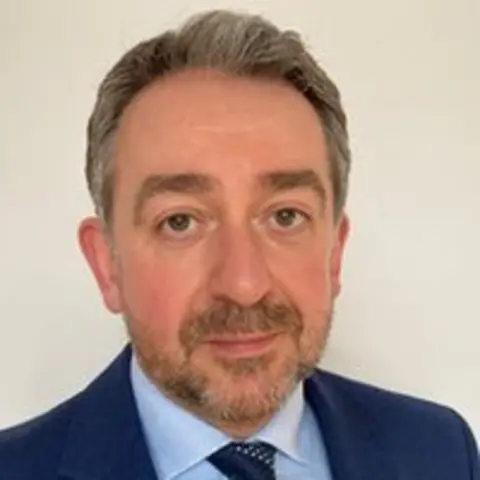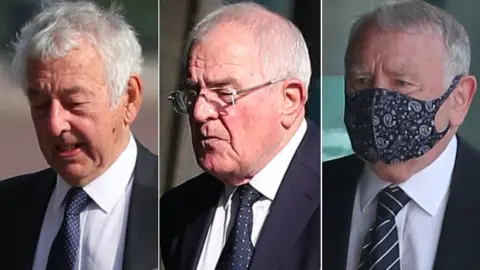Hillsborough: Why the prosecutions collapsed

 PA Media
PA MediaThe collapse of the latest Hillsborough disaster trial was predicted - because of a legal technicality that was known to all involved.
It has been 32 years since 96 Liverpool fans were killed in the Hillsborough disaster that, by common acceptance, everyone now knows should never have happened.
There has been an inquiry into stadium safety, an independent review panel to get to the full truth, two sets of inquests - the second set to correct shortcomings of the first - and four criminal trials.
The upshot is that while the jury for the second set of inquests reached damning conclusions about police failings on the day, there has only been a single conviction - and that was the stadium's health and safety officer, who was fined £6,500.
Every other prosecution has failed.
First, the match day commander was found not guilty of manslaughter by gross negligence - and now a solicitor and two senior police officers, accused of cooking up false accounts to cover up South Yorkshire Police's failures, have also been cleared.
The roots of the collapsed trial of solicitor Peter Metcalf and retired police officers Donald Denton and Alan Foster can be found in a twist in the law which was clear from the outset of the case against them - and that raises questions for the Crown Prosecution Service as to why the trial went ahead at all.
The three men were alleged to have played a role in changing the accounts of some South Yorkshire Police officers who were involved in the day.
The specific crime the men were accused of committing was perverting the course of justice, which can lead to a life sentence.
It's one of the most serious offences in England and Wales, because it is a crime against the justice system itself as it prevents courts from getting to the truth.
And that's where the problem lay for the Crown Prosecution Service - it could not prove, as a matter of law, that the men had intended to lie to any court or judicial process at all.
Some inquiries... are not real inquiries
The accounts the men were alleged to have manipulated had been prepared for Lord Justice Taylor's short inquiry into what had happened. He was under pressure to quickly come up with safety recommendations for football grounds before the start of the new season.
And so, and this is the key point, while he was a very senior judge in charge of a very important inquiry, it was not, in legal terms, a full "public inquiry" with the full powers to get to the truth. And that really matters if someone is going to be accused of lying or manipulating a formal judicial process or inquiry.
A series of important legal rulings down the years has clarified what the "course of justice" actually means - and it does not include the kind of review that was headed by Lord Justice Taylor.
He had no powers to force witnesses to attend or to give evidence under oath, as they would have to do in an official public inquiry or court. He could not even force those who did take part to tell him everything they knew.
And so, today, the judge in the trial of the three men concluded that none of the men could be accused of perverting the course of justice, because at the time the statements were prepared there had been no judicial process to pervert.
CPS warned in 2018
The Crown Prosecution Service knew about this technicality long before the trial began - because a previous judge involved in the Hillsborough saga had made exactly the same point in 2018.
So prosecutors had pinned their hopes on convincing a jury that although the accounts were prepared for the Taylor inquiry, everyone involved would have known that other formal proceedings were coming - inquests, criminal investigations or damages cases.
But the judge has said the CPS simply could not prove that case to a jury.
"The problem is that there is little or no evidence about those other proceedings and/or there is no basis upon which to say that anything done by any of these defendants had a tendency to pervert the course of public justice in relation to other proceedings," said Mr Justice William Davis in his ruling ending the case against the three men.
"I have concluded that there is no case fit for the jury's consideration."
Judges must follow the letter of the law - and whatever the actions of the three defendants back in 1989, they are all innocent of perverting the course of justice.
Their lawyers say the Crown Prosecution Service has serious questions to answer - labelling the entire affair a multi-million pound "witch-hunt" that should never have happened because there was no case against any of the men.
Some say there is an urgent need to change the law to ensure that a future and similar criminal case could be considered by a jury.
When he was an MP, Andy Burnham, the Merseyside-born mayor of Greater Manchester, lobbied for a "Hillsborough law" which would compel public institutions, and those working for them, to not only tell the truth in any kind of inquiry or proceedings, but to tell the full truth with candour and frankness.
But were that to be passed by Parliament, it would not apply to the tragic events of Hillsborough.
